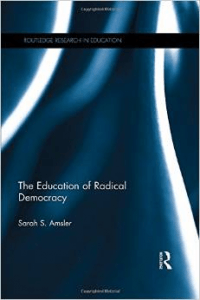 I am delighted to annouce the publication of my new book, The Education of Radical Democracy. It explores why I think radical democracy is so necessary, difficult, and possible today – and why it is vital that we understand it as an educative activity. The book draws on critical social theory and critical pedagogy to illustrate what enables and sustains work for radical democratization, and considers how we can begin such work in everyday life.
I am delighted to annouce the publication of my new book, The Education of Radical Democracy. It explores why I think radical democracy is so necessary, difficult, and possible today – and why it is vital that we understand it as an educative activity. The book draws on critical social theory and critical pedagogy to illustrate what enables and sustains work for radical democratization, and considers how we can begin such work in everyday life.
“‘The most fundamental lessons that are required for humanization today, as we are reminded by those with long experiences of counter-hegemonic and radically democratic struggle in other places and times, cannot be learned through study alone. Methods for cultivating a radically democratic and militantly optimistic relationship with ourselves, other people, time and space, possibility and the future do not pre-exist our development of these methods for our own situation. As Ernst Bloch argued, ‘man [and woman] . . . is repeatedly transformed in his [or her] work and by it. [S]/he repeatedly stands ahead on frontiers which are no longer such because s/he perceives them, s/he ventures beyond them’ (1995, p. 246). Frontier politics, which is the politics of possibility, is an inherently educative praxis. In a moment where the Front is itself so politicized, certain kinds of practices become particularly important – practices that clarify work on emerging and not-yet possibilities; that visualize and make audible latent tendencies; that intensify and magnify the ‘uncertain, flickering, and often weak lights’ which are dismissed as ephemeral but which may in fact foreshine real possibility; that open up spaces for people to practise critical thinking and being together; that attend to the social and emotional discomforts of radically democratic, counter-cultural and systemically oppositional practice, and to the transformation of individualized fear into common courage; that connect the dots of both foreclosure and possibility in order to construct maps of the apparatuses of hopelessness and models of the architectures of hope. And, in a moment where even these practices are out of reach, other kinds of education – in the ontology of the unfinished and the becoming; in the skills of democratic receptivity; in habits of co-operation, in processes of prefiguration; in the arts of anticipation; and in methods for incorporating these into the political work of constructing material and social conditions for such activities – become critical as well.’
Comments are closed.